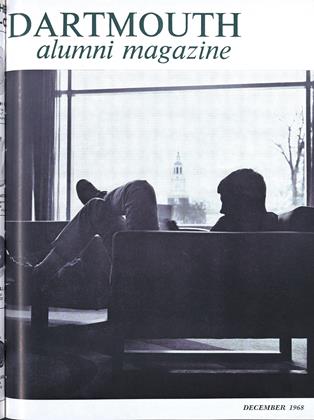IMPRESSIVE both in content and format, The Dartmouth Course Guide appeared on campus last month and marked, in its second year of publication, a decided enlargement of this student effort to evaluate individual courses and the overall educational program of the College.
Although 109 course and department critiques make up the bulk of the 212-page Guide, the 1968 edition contains an introductory section dealing with broader subjects such as the relevance of the Dartmouth educational experience, ROTC, an alternative academic calendar, faculty tenure (myth and reality), and coeducation. The alumni point of view is represented by three short essays by Louis T. Benezet '36, president of the Claremont (Calif.) Graduate School and University Center; Thomas W. Braden '40, Trustee of the College and former head of the California State Board of Education; and Prof. Michael Heyman '51 of the University of California School of Law at Berkeley.
In the students' introductory section, the Dartmouth educational experience does not come off with very high marks, and one means of achieving improvement in the view of the editors, would be a closer working together of faculty and students in fashioning both the content and mechanics of courses and programs. A nay vote for ROTC and a yea vote for coeducation are registered, and it is also proposed that the College look into the merits of the 4-1-4 system (recently adopted by Williams and Middlebury) in which the student takes four courses for a term of 12 or 13 weeks, then one course for about a month, and then four more courses in a term covering the rest of the college year. The flexible, imaginative use of the short, one-month period, possibly in some off-campus project, is touted as one of the advantages of the 4-1-4 system.
The critiques of individual courses, although candid, are generally restrained when low grades are meted out to teachers or subject matter. By and large, however, the reader finds enough reports of unrestrained enthusiasm to conclude that today's Dartmouth undergraduate! can fashion an exciting educational program for himself, if he is not afraid of the hard work that seems to go along with most of the offerings labeled "do not miss."
A canvass of the student body provided some basis for the 1968 DartmouthCourse Guide. Production of the book involved a small army, including 87 writers, an editorial staff of 13, a business staff of five, and even a computer staff of four. Heading the staff were Robert B. Harrington '70, publisher; Richard F. Babcock '69, editor; James W. Kasameyer '69, executive editor; Winthrop A. Rockwell '70, managing editor; and Michael Maynard '71, business manager.
 View Full Issue
View Full Issue
More From This Issue
-
 Feature
Feature"Our trusty and well-beloved John Wentworth Esq., Governor"
December 1968 By Susan Liddicoat -
 Feature
FeatureOf Peaceful Men and Violent Ideas
December 1968 By DEAN THADDEUS SEYMOUR -
 Feature
FeaturePolitical Year 1968: A Reprise
December 1968 By EDWARD W. GUDE '59, INSTRUCTOR IN GOVERNMENT -
 Class Notes
Class Notes1934
December 1968 By STANLEY H. SILVERMAN, EDWARD S. BROWN JR. -
 Article
ArticleThe Faculty
December 1968 By WILLIAM R. MEYER -
 Class Notes
Class Notes1935
December 1968 By RICHARD K. MONTGOMERY, C. HALL COLTON
Article
-
 Article
ArticleMasthead
November, 1930 -
 Article
ArticleYoung Alumni Award: Julie Ann Koeninger '81, T'85
October 1993 -
 Article
ArticleBaseball and the Pursuit of Innocence
June 1995 By Jim Collins '84 -
 Article
ArticleNewsmakers
Jul/Aug 2004 By MIKE MAHONEY '92 -
 Article
ArticleFrom the source to the sea: a cleaner Connecticut
NOVEMBER 1981 By Robert Linck -
 Article
ArticleBoxing: Not Just for Men Anymore
DECEMBER 1998 By Stephanie Edwards '00

